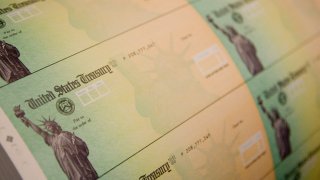
- More payments may come via debit cards and paper checks.
- Agencies didn't say how many payments were coming in this batch.
- More than $242 billion has been disbursed so far.
A second batch of $1,400 COVID stimulus checks is scheduled to land in people's bank accounts on Wednesday, March 24.
Those checks began processing on Friday and may be available in some accounts even earlier, according to the Treasury Department, IRS and Bureau of the Fiscal Service, which announced the payments on Monday.
The latest batch also includes a "large number" of mailed paper checks and prepaid debit cards, according to the agencies.
Get South Florida local news, weather forecasts and entertainment stories to your inbox. Sign up for NBC South Florida newsletters.
People who do not receive a March 24 payment by direct deposit should be on the lookout for a mailed payment in the coming weeks.
The agencies did not specify how many checks are included in this second disbursement round. The first round included about 90 million payments that totaled more than $242 billion.
"The IRS continues to send the third round of stimulus payments in record time," IRS Commissioner Chuck Rettig said in a statement.
Money Report
This new round of stimulus checks was authorized by Congress and President Joe Biden earlier this month.
The payments include up to $1,400 per person, plus $1,400 per child and adult dependent.
Like the past checks, you have to meet certain criteria to qualify.
Individuals with up to $75,000 in adjusted gross income will get a full payment, as well as heads of household with up to $112,500 and married couples who file jointly with up to $150,000.
This time, those payments phase out faster, and are capped at $80,000 for individuals, $120,000 for heads of household and $160,000 for married couples.
If you are expecting a payment, you generally do not need to do anything in order to get the money, the agencies said.
The IRS Get My Payment tool is available in order to check on the status of the payments.
Those who will get the money automatically include those who have their information on file with the government via past tax returns or who used the IRS nonfiler tool last year. People who receive federal benefits — such as Social Security, Supplemental Security Income or Veterans Affairs — are also slated to get the money automatically.
People who typically do not file tax returns and who do not have their information on file with the government are encouraged to file a 2020 tax return in order to claim their payment. The IRS website provides more information on how to file federal tax returns for free.






